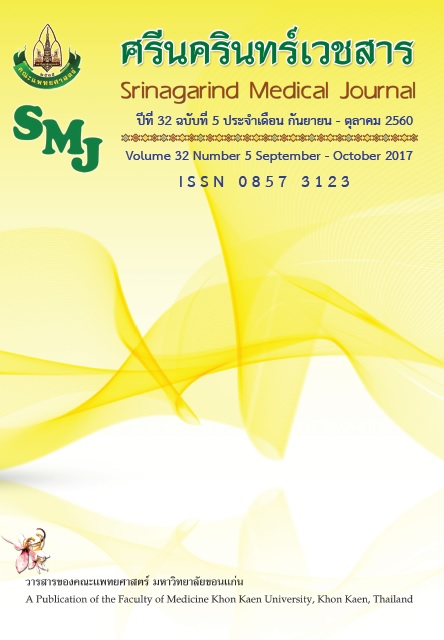Relationship of Functional Mobility and Quality of Life with Executive Function in Older Adults
Abstract
Background and Objective: Impaired executive functions, especially cognitive deficits, can have an impact on daily activities and functional mobility, and can thereby reduce quality of life. The purpose of this study was to determine the relationship of functional mobility and quality of life with the level of executive functioning among older adults residing in Charoen Rat Sub-District, Mae Chai District, Phayao Province.
Methods: A total of 45 participants were recruited for this cross-sectional descriptive study. There were 9 men (20.00%) and 36 women (80.00%) aged 60 to 85 (mean 67.13±6.41) years. A Digit span backward test was used to measure executive function. The quality of life was measured using by WHOQOL-BREF-THAI questionnaires. The functional mobility was measured by the Timed Up and Go (TUG) test. All data were analyzed by descriptive statistics and the Spearman rank correlation coefficient.
Results: The scores of digit span backward tests showed a low negative correlation with the scores of TUG and moderate positive correlation with the scores of quality of life (r=-0.36 and r=0.53 respectively)
Conclusion: Executive functions were negatively correlated with functional mobility, yet there was a positive correlation with quality of life
ความสัมพันธ์ของความสามารถด้านการเคลื่อนไหวและคุณภาพชีวิตกับการทำงานของสมองระดับสูงในผู้สูงอายุ
อรรจน์มน ธรรมไชย*, ณิชาภา พาราศิลป์, เอกราช วงศ์ษายะ, เกวลี สีหราช
สาขากายภาพบำบัด คณะสหเวชศาสตร์ มหาวิทยาลัยพะเยา
หลักการและวัตถุประสงค์: ความบกพร่องของการทำงานของสมองระดับสูงโดยเฉพาะความบกพร่องด้านการรู้คิดมีผลกระทบต่อการปฏิบัติกิจวัตรประจำวัน ความสามารถด้านการเคลื่อนไหวและคุณภาพชีวิต การศึกษานี้มีวัตถุประสงค์เพื่อศึกษาความสัมพันธ์ระหว่างความสามารถด้านการเคลื่อนไหวและคุณภาพชีวิตกับการทำงานของสมองระดับสูงในผู้สูงอายุตำบลเจริญราษฎร์ อำเภอแม่ใจ จังหวัดพะเยา
วิธีการศึกษา: เป็นการศึกษาเชิงพรรณนาแบบตัดขวาง มีผู้เข้าร่วมการศึกษาจำนวน 45 ราย เพศชาย 9 ราย (ร้อยละ 20.00) เพศหญิง 36 ราย (ร้อยละ 80.00) อายุระหว่าง 60 – 85 ปี (เฉลี่ย 67.13±6.41 ปี) การทดสอบการทวนกลับตัวเลข (Digit span backward) ถูกใช้เพื่อประเมินการทำงานของสมองระดับสูง ประเมินคุณภาพชีวิตด้วยแบบประเมิน WHOQOL–BREF–THAI และประเมินความสามารถด้านการเคลื่อนไหวด้วยการทดสอบ Time up and go (TUG) วิเคราะห์ข้อมูลโดยใช้สถิติเชิงพรรณนาและสถิติสหสัมพันธแบบสเปียร์แมน
ผลการศึกษา: คะแนนการทดสอบการทวนกลับตัวเลขมีความสัมพันธ์เชิงลบในระดับต่ำกับระยะเวลาของการทดสอบ TUG และมีความสัมพันธ์เชิงบวกในระดับปานกลางกับคะแนนคุณภาพชีวิต (r = -0.36 และ r = 0.53ตามลำดับ)
สรุป: การทำงานของสมองระดับสูงมีความสัมพันธ์กับความสามารถด้านการเคลื่อนไหวในเชิงลบและสัมพันธ์กับคุณภาพชีวิตในเชิงบวก




